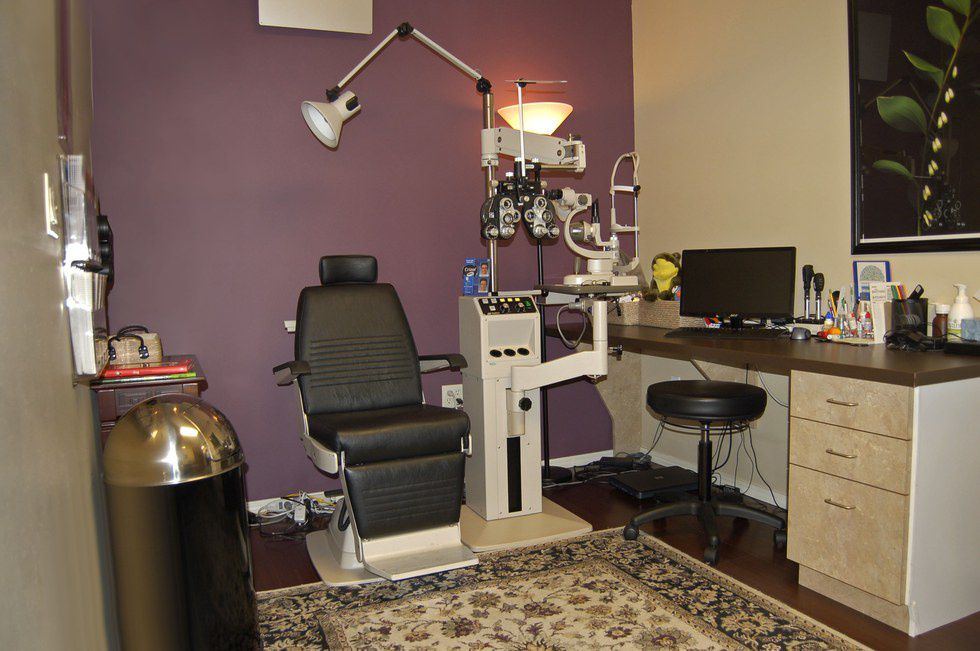I have Duane Syndrome, a rare form of strabismus that only affects about 0.06% of Americans (out of America's nearly 325,000,000 people, less than 200,000 people have Duane Syndrome). I have Type 3, which is the rarest type of Duane Syndrome, making up only 15% of Duane's patients. I have very little peripheral vision and absolutely no depth perception, I've had two surgeries on my eyes (and am considering a third), and one of my eyes is noticeably bigger than the other and wanders, especially when I'm tired. I've never met anyone else with Duane Syndrome.
When you have a syndrome this rare, it's easy to feel like a zoo animal, gawked at and studied. I've felt like this several times, but the best example took place a couple of summers ago. I work as a caregiver for a girl with Myotonic Muscular Dystrophy, and one day I had to take her to an eye doctor appointment -- a specialist for her cataracts. I've developed an intense hatred for eye doctors, so I was jittery and nervous the entire visit, from the moment I stepped into the building to the moment I got home and planted myself on the couch. At least he was just looking at her eyes; I could just sit in the back of the room and bolt out of there as soon as he was done with her. Or so I thought.
When he was done looking at her, he flicked one of the lights on and came to shake my hand and thank me for taking her in. And then he stopped, keeping his bear trap of a hand clamped onto mine and peering into my face. I squirmed under his gaze, finally blurting out, "I have Duane Syndrome."
A grin spread across his face, crinkling the corners of his eyes like tissue paper, as he practically shouted, "I thought so!" Part of me was impressed that this doctor, in the time it had taken us to clasp hands, had managed to notice and diagnose my syndrome. The rest of me, though, cringed and wished to slip from his grasp like an eel as his eyes lit up and he herded me to the padded torture device in the center of the room.
"Can I look?" He'd already planted me in the seat, so I don't know why he was bothering to ask. "If you'd just sit here for a minute...I've read about this in textbooks, but I've never seen it before!"
In that moment, I was reduced to my illness -- I was Duane Syndrome personified.
It is exactly this that I want to warn people -- especially doctors -- against doing. This doctor meant well, but he reduced me to my syndrome. I felt less than human, like something that is meant to be studied under a microscope. It also made me even more self-conscious, because it took him perhaps three heartbeats to diagnose me; I've known all my life that my eyes are noticeably messed up, but I had hung onto the hope that, since not everyone walks up to me and says, "What's wrong with your eyes?" (which people do ask me, exactly like that) that not everyone noticed. This made me certain, though. As I drove home, as I walked through the store the next day, it felt like everyone was gawking, asking themselves, "What's wrong with her? Gosh, her eyes are so creepy!"
I've always loved the color of my eyes -- light silver-blue, rimmed with a thick line of darker blue on the outside of my irises. But I hate every single picture of myself because all I can see is my eyes -- the difference in size, the eye that's slightly off-center. After that summer I was certain that everyone saw that, too. Maybe guys aren't interested in me simply because my eyes creep them out -- my eyes make me ugly. I'm ugly.
This is how my thoughts degenerated; they went down this path for a long time, and if I'm honest, I still think that way most of the time. That's not to say that this is the doctor's fault; these thoughts were already there, constantly attacking and retreating, waiting for me to become unable to defend myself against them anymore. He certainly didn't mean to serve as the final blow to my defenses; he was simply fascinated to see something he'd only ever learned about, right in front of him. He loves his job, which is great. He seemed like a great doctor.
I'm not angry or bitter at him -- but here's the thing: I wasn't his patient. Would he have stopped me if I'd been a random person in the street or at the grocery store? I doubt it, and it's a similar concept regardless of whether or not I was in his office. I wasn't his patient, so it wasn't really his place to pressure me to sit in his chair so he could scrutinize my rare syndrome.
Different patients have different levels of comfort regarding their illnesses, rare or not. I've talked to come people who really like to inform people about their illness, others who are only comfortable talking about it with people they know, and still others who never want it brought up by anyone but themselves.
The best doctors look at their patients as individuals, not their illnesses. They get to know us on a personal level -- what we study in school, what we hope to do one day, how old our cats (or kids) are. They should be conscious of our insecurities and compassionate of our circumstances rather than simply treating our symptoms and then washing their hands of us, or using us as a means of studying a disorder instead of helping a person.
That's all we ask: Competent, compassionate treatment.

























 sunrise
StableDiffusion
sunrise
StableDiffusion
 bonfire friends
StableDiffusion
bonfire friends
StableDiffusion
 sadness
StableDiffusion
sadness
StableDiffusion

 purple skies
StableDiffusion
purple skies
StableDiffusion

 true love
StableDiffusion
true love
StableDiffusion
 My Cheerleader
StableDiffusion
My Cheerleader
StableDiffusion
 womans transformation to happiness and love
StableDiffusion
womans transformation to happiness and love
StableDiffusion
 future life together of adventures
StableDiffusion
future life together of adventures
StableDiffusion





















